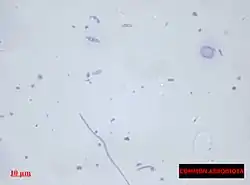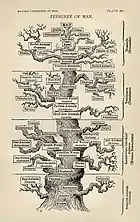Aerobiology
Aerobiology (from Greek ἀήρ, aēr, "air"; βίος, bios, "life"; and -λογία, -logia) is a branch of biology that studies organic particles, such as bacteria, fungal spores, very small insects, pollen grains and viruses, which are passively transported by the air.[1] Aerobiologists have traditionally been involved in the measurement and reporting of airborne pollen and fungal spores as a service to those with allergies.[1]

Some common air-borne spores
The first finding of airborne algae took place in Germany in 1910.[2]
See also
References
- "Spotlight on: Aerobiology". The Biologist. Royal Society of Biology. Retrieved 26 October 2017.
- Guadalupe Roy-Ocotla; Jorge Carrera (1993). "Aeroalgae: Responses to some aerobiological questions". Grana. 32 (1): 48–56. doi:10.1080/00173139309436419.
External links
- International Society of Aerobiology Archived 28 May 2011 at the Wayback Machine
- https://www.knowmold.com/know-your-mold.html
This article is issued from Wikipedia. The text is licensed under Creative Commons - Attribution - Sharealike. Additional terms may apply for the media files.
